1、toward explaining mental health disparities
- 格式:pdf
- 大小:76.69 KB
- 文档页数:2
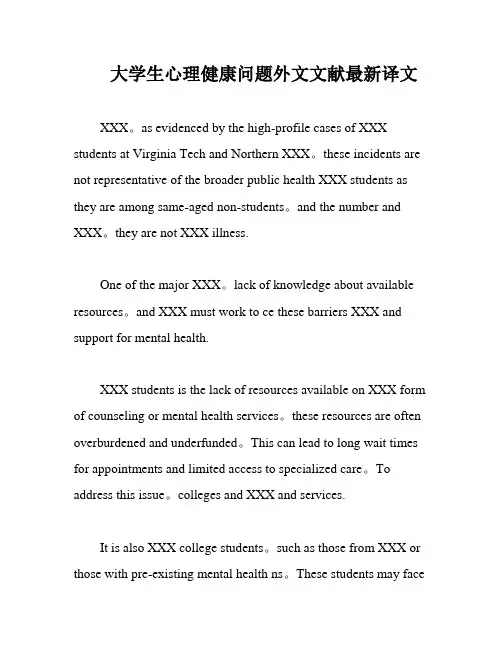
大学生心理健康问题外文文献最新译文XXX。
as evidenced by the high-profile cases of XXX students at Virginia Tech and Northern XXX。
these incidents are not representative of the broader public health XXX students as they are among same-aged non-students。
and the number and XXX。
they are not XXX illness.One of the major XXX。
lack of knowledge about available resources。
and XXX must work to ce these barriers XXX and support for mental health.XXX students is the lack of resources available on XXX form of counseling or mental health services。
these resources are often overburdened and underfunded。
This can lead to long wait times for appointments and limited access to specialized care。
To address this issue。
colleges and XXX and services.It is also XXX college students。
such as those from XXX or those with pre-existing mental health ns。
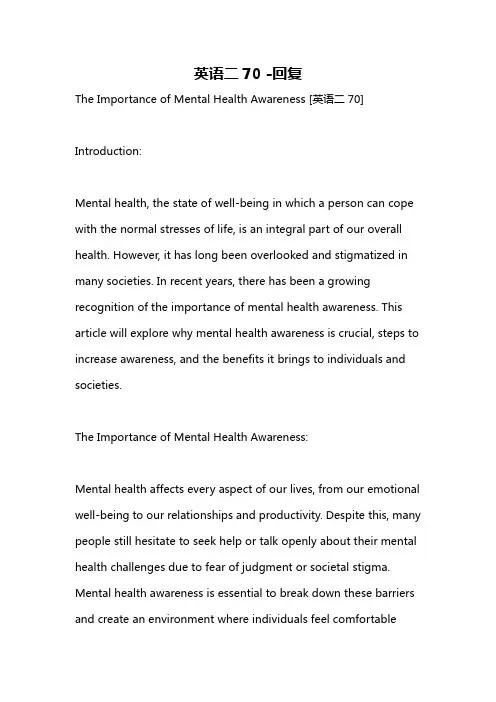
英语二70 -回复The Importance of Mental Health Awareness [英语二70]Introduction:Mental health, the state of well-being in which a person can cope with the normal stresses of life, is an integral part of our overall health. However, it has long been overlooked and stigmatized in many societies. In recent years, there has been a growing recognition of the importance of mental health awareness. This article will explore why mental health awareness is crucial, steps to increase awareness, and the benefits it brings to individuals and societies.The Importance of Mental Health Awareness:Mental health affects every aspect of our lives, from our emotional well-being to our relationships and productivity. Despite this, many people still hesitate to seek help or talk openly about their mental health challenges due to fear of judgment or societal stigma. Mental health awareness is essential to break down these barriers and create an environment where individuals feel comfortableseeking help and support when needed.Steps to Increase Mental Health Awareness:1. Education and Integration: The first step toward increasing mental health awareness is educating people about the significance of mental health and its impact on overall well-being. This can be done through school and community programs that provide information on common mental health conditions, coping mechanisms, and how to access mental health services.2. Normalizing Conversations: Encouraging open discussions about mental health is crucial to reducing stigma. Public figures, such as celebrities or influential individuals, can play an essential role in normalizing these conversations by publicly sharing their own mental health experiences or advocating for mental health initiatives. Additionally, media platforms can portray mental health in a more positive and accurate light, emphasizing the importance of seeking support and eradicating stereotypes.3. Integrating Mental Health into Healthcare Systems: Healthcare providers should be equipped with the necessary knowledge andskills to address mental health concerns effectively. Introducing mental health screenings as a routine part of medical check-ups can help identify potential issues early on and provide appropriate interventions. Collaborating with mental health professionals, such as psychologists or therapists, can ensure comprehensive care for individuals struggling with mental health.The Benefits of Mental Health Awareness:1. Improved Individual Well-being: Increased mental health awareness leads to improved individual well-being by enabling early detection and intervention. Individuals become more aware of their own mental health needs, allowing them to recognize signs of distress and seek support promptly. This, in turn, leads to enhanced coping skills, reduced self-stigma, and an overall improvement in quality of life.2. Reduced Stigma and Discrimination: Mental health awareness plays a crucial role in reducing stigma and discrimination associated with mental health conditions. When people are aware of the realities of mental health challenges, they are more likely to show empathy, understanding, and support to those affected. Thiscreates a society that values mental health and supports individuals in their journey to recovery.3. Improved Productivity and Social Impact: Promoting mental health awareness in workplaces and educational institutions fosters a more supportive and inclusive environment. When mental health is prioritized, individuals are better able to manage stress, maintain mental well-being, and contribute meaningfully to their work or studies. This not only benefits individuals but also has a positive socio-economic impact on communities and societies as a whole.Conclusion:Mental health awareness is undeniably crucial, yet often overlooked. By taking steps to increase awareness, society can create a nurturing environment that supports individuals in their mental health journey. Increased awareness leads to numerous benefits, both for individuals and society as a whole. Let us continue to promote mental health awareness and work towards creating a world where mental health is prioritized anddestigmatized.。
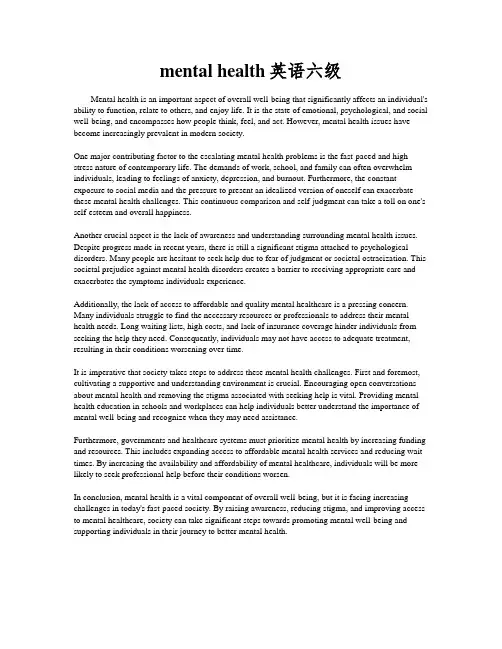
mental health英语六级Mental health is an important aspect of overall well-being that significantly affects an individual's ability to function, relate to others, and enjoy life. It is the state of emotional, psychological, and social well-being, and encompasses how people think, feel, and act. However, mental health issues have become increasingly prevalent in modern society.One major contributing factor to the escalating mental health problems is the fast-paced and high-stress nature of contemporary life. The demands of work, school, and family can often overwhelm individuals, leading to feelings of anxiety, depression, and burnout. Furthermore, the constant exposure to social media and the pressure to present an idealized version of oneself can exacerbate these mental health challenges. This continuous comparison and self-judgment can take a toll on one's self-esteem and overall happiness.Another crucial aspect is the lack of awareness and understanding surrounding mental health issues. Despite progress made in recent years, there is still a significant stigma attached to psychological disorders. Many people are hesitant to seek help due to fear of judgment or societal ostracization. This societal prejudice against mental health disorders creates a barrier to receiving appropriate care and exacerbates the symptoms individuals experience.Additionally, the lack of access to affordable and quality mental healthcare is a pressing concern. Many individuals struggle to find the necessary resources or professionals to address their mental health needs. Long waiting lists, high costs, and lack of insurance coverage hinder individuals from seeking the help they need. Consequently, individuals may not have access to adequate treatment, resulting in their conditions worsening over time.It is imperative that society takes steps to address these mental health challenges. First and foremost, cultivating a supportive and understanding environment is crucial. Encouraging open conversations about mental health and removing the stigma associated with seeking help is vital. Providing mental health education in schools and workplaces can help individuals better understand the importance of mental well-being and recognize when they may need assistance.Furthermore, governments and healthcare systems must prioritize mental health by increasing funding and resources. This includes expanding access to affordable mental health services and reducing wait times. By increasing the availability and affordability of mental healthcare, individuals will be more likely to seek professional help before their conditions worsen.In conclusion, mental health is a vital component of overall well-being, but it is facing increasing challenges in today's fast-paced society. By raising awareness, reducing stigma, and improving access to mental healthcare, society can take significant steps towards promoting mental well-being and supporting individuals in their journey to better mental health.。

心理健康调查英语作文The Importance of Mental Health in Modern Society.In today's fast-paced and often stressful world, the importance of mental health has become increasingly apparent. As individuals, we often focus on physical health, neglecting the equally crucial aspect of our mental well-being. The truth is, mental health is fundamental to our overall happiness and productivity. This essay aims to explore the essence of mental health, its significance in daily life, and the steps we can take to promote and maintain it.Defining Mental Health.Before delving into the intricacies of mental health,it's crucial to understand what it entails. Mental health refers to our emotional, psychological, and social well-being. It affects how we think, feel, and act, and it determines how we handle stress, relate to others, and makechoices. When our mental health is positive, we are more resilient, creative, and able to cope with life's challenges. Conversely, poor mental health can lead to anxiety, depression, and other psychological issues that can significantly impact our quality of life.The Impact of Mental Health on Daily Life.The influence of mental health on our daily lives is profound. It shapes our interactions with others, our ability to focus and learn, and our overall happiness. For instance, individuals with positive mental health are more likely to have strong social relationships, be engaged in their work or studies, and experience higher levels of satisfaction with life. On the other hand, mental health issues can lead to isolation, poor performance, and a general sense of dissatisfaction.Moreover, mental health has a direct impact on our physical health. Chronic stress, anxiety, and depression can lead to a weakened immune system, sleep problems, and even physical health conditions such as heart disease anddiabetes. This interconnectedness underscores the importance of addressing mental health concerns alongside physical ones.Promoting and Maintaining Mental Health.Given the significant role mental health plays in our lives, it's essential to take steps to promote and maintain it. Here are some practical strategies:1. Seek Support: When facing mental health challenges, it's crucial to seek support from friends, family, or professionals. Sharing our feelings and experiences can help us gain perspective, understand our triggers, and develop coping mechanisms.2. Practice Self-Care: Prioritizing self-care is essential for maintaining mental health. This includes getting enough sleep, eating a balanced diet, exercising regularly, and engaging in activities that bring joy and relaxation.3. Manage Stress: Stress is a common cause of mental health issues. Learning to manage stress through techniques like mindfulness, meditation, or simply taking a moment to pause and breathe can help reduce its impact.4. Connect with Others: Having strong social connections is crucial for maintaining positive mental health. Regularly engaging with family, friends, and community can help us feel supported and less isolated.5. Seek Professional Help: When necessary, seeking professional help from a therapist or psychiatrist can be transformative. These professionals can provide guidance, treatment, and support tailored to individual needs.In conclusion, mental health is a crucial aspect of our overall well-being that deserves our attention and care. By understanding its importance, taking steps to promote and maintain it, and seeking support when needed, we can enjoy a more balanced, fulfilling, and productive life. As we move forward in this increasingly complex world, let us remember that our mental health is just as important as ourphysical health, and it deserves to be nurtured and protected.。
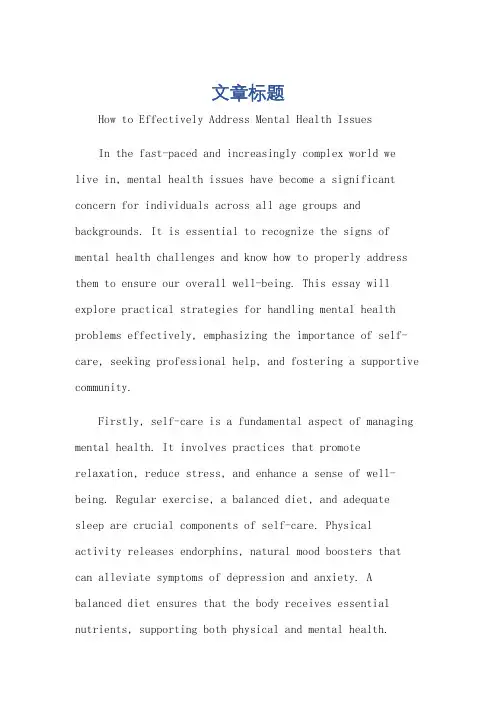
文章标题How to Effectively Address Mental Health IssuesIn the fast-paced and increasingly complex world welive in, mental health issues have become a significant concern for individuals across all age groups and backgrounds. It is essential to recognize the signs of mental health challenges and know how to properly address them to ensure our overall well-being. This essay will explore practical strategies for handling mental health problems effectively, emphasizing the importance of self-care, seeking professional help, and fostering a supportive community.Firstly, self-care is a fundamental aspect of managing mental health. It involves practices that promote relaxation, reduce stress, and enhance a sense of well-being. Regular exercise, a balanced diet, and adequate sleep are crucial components of self-care. Physicalactivity releases endorphins, natural mood boosters that can alleviate symptoms of depression and anxiety. A balanced diet ensures that the body receives essential nutrients, supporting both physical and mental health.Meanwhile, adequate sleep is essential for cognitivefunction and emotional regulation. Additionally, engagingin hobbies, meditation, and mindfulness practices can provide a sense of calm and clarity, helping individuals cope with stress and anxiety.Secondly, seeking professional help is often necessary for addressing mental health issues. Licensed mental health professionals, such as psychologists, psychiatrists, and counselors, are trained to assess and treat various mental health conditions. They can provide personalized support, guidance, and treatment plans tailored to the individual's needs. It is important to overcome any stigma associatedwith seeking help and recognize that seeking professional assistance is a brave and responsible step towardsimproving mental well-being.Moreover, fostering a supportive community is vital for mental health. Having a network of friends, family, and peers who are understanding and empathetic can provide a sense of belonging and validation. Sharing feelings and experiences with others can reduce isolation and loneliness, two common contributors to mental health problems.Additionally, joining support groups or participating in community activities can connect individuals with others who share similar challenges, fostering a sense ofsolidarity and hope.In conclusion, addressing mental health issueseffectively requires a multifaceted approach that includes self-care, professional help, and community support. By prioritizing our mental well-being, seeking help when needed, and fostering supportive relationships, we can navigate the challenges of mental health and leadfulfilling lives.**文章标题** 如何有效处理心理健康问题在我们生活节奏快、日益复杂的世界中,心理健康问题已成为各个年龄和背景的人们所关注的重要问题。
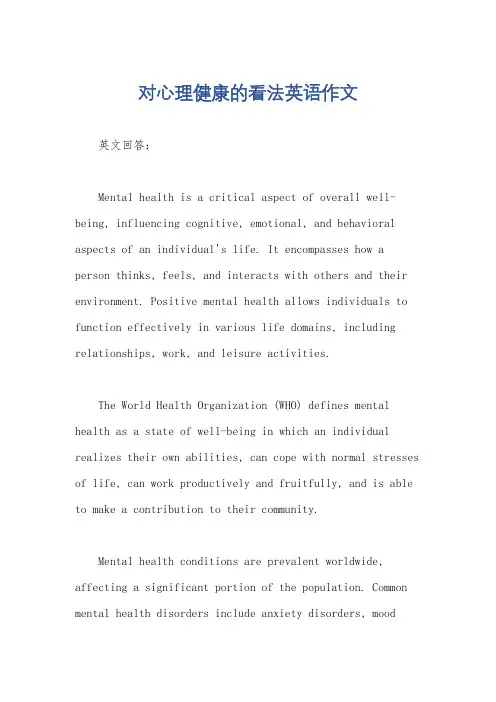
对心理健康的看法英语作文英文回答:Mental health is a critical aspect of overall well-being, influencing cognitive, emotional, and behavioral aspects of an individual's life. It encompasses how a person thinks, feels, and interacts with others and their environment. Positive mental health allows individuals to function effectively in various life domains, including relationships, work, and leisure activities.The World Health Organization (WHO) defines mental health as a state of well-being in which an individual realizes their own abilities, can cope with normal stresses of life, can work productively and fruitfully, and is able to make a contribution to their community.Mental health conditions are prevalent worldwide, affecting a significant portion of the population. Common mental health disorders include anxiety disorders, mooddisorders, and substance use disorders. Factorscontributing to mental health challenges can include genetic predispositions, life experiences, trauma, and environmental stressors.Addressing mental health concerns is essential for improving overall health and quality of life. Early identification and intervention can prevent the worsening of symptoms and contribute to recovery. Treatment options for mental health conditions vary depending on the specific disorder and may include medication, psychotherapy, self-help strategies, and lifestyle modifications.Promoting mental well-being plays a crucial role in maintaining and enhancing mental health. Healthy lifestyle practices, such as regular exercise, adequate sleep, and a balanced diet, can contribute to positive mental health. Additionally, engaging in stress-reducing activities, such as meditation, mindfulness, or spending time in nature, can help promote relaxation and emotional regulation.Mental health is an integral part of human health andshould be treated with the same level of importance as physical health. By reducing stigma, promoting awareness, and providing accessible mental health services, we can create a society where individuals are supported in their mental health journeys and can thrive in all aspects oflife.中文回答:心理健康是整体幸福感的一个关键方面,它影响着个体的认知、情绪和行为方面。

精神健康英语四级作文In recent years, mental health has emerged as a critical issue that demands attention and understanding. As society progresses, the pressures of daily life, work, and social interactions have led to an increase in stress-related disorders and other mental health conditions. This essay aims to explore the importance of mental health, the challenges faced by individuals, and the steps that can be taken to promote well-being.Firstly, mental health is as important as physical health for leading a balanced life. It affects how we think, feel, and act, and it plays a crucial role in our ability to handle stress, relate to others, and make choices. However, despite its significance, mental health is often overlooked or stigmatized, leading to a lack of awareness and support for those who need it most.The challenges faced by individuals with mental health issues are multifaceted. The societal stigma attached to mental illness can prevent people from seeking help, while the lack of resources and understanding within healthcare systems can exacerbate the problem. Furthermore, the fast-paced nature of modern life can contribute to feelings of isolation and anxiety, making it difficult for individuals to find the support and care they need.To address these challenges, it is essential to takeproactive steps to promote mental health. One of the most effective ways to do this is through education and awareness campaigns that aim to dispel myths and stereotypes about mental health conditions. By increasing understanding, we can create a more supportive environment for those who are struggling.Additionally, the integration of mental health services into primary healthcare can provide individuals with easier access to the help they need. This includes counseling, therapy, and in some cases, medication. Early intervention is key in managing mental health issues, and having these services readily available can make a significant difference.Moreover, fostering a culture of open communication and empathy is vital. Encouraging individuals to share their experiences and feelings without fear of judgment can help to break down the barriers that prevent people from seeking help. Employers, educators, and community leaders all have a roleto play in creating such an environment.In conclusion, mental health is a pressing concern that requires a comprehensive and empathetic approach. By raising awareness, improving access to care, and fostering asupportive culture, we can work towards a society wheremental health is valued as much as physical health. It is through collective effort and understanding that we canensure that mental health becomes a priority for everyone.。
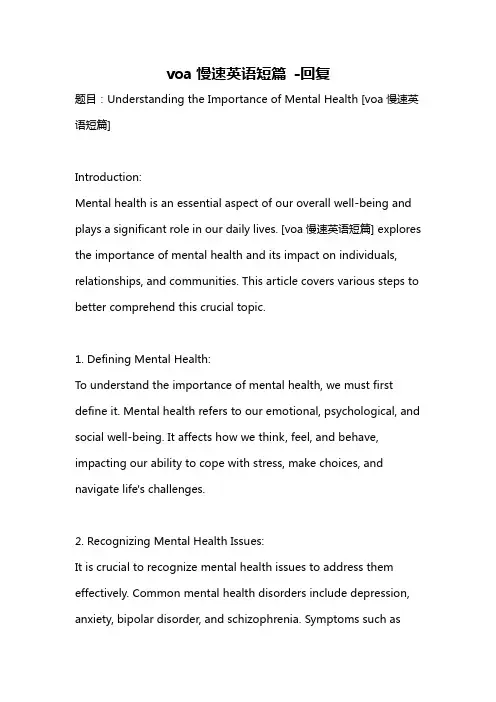
voa慢速英语短篇-回复题目:Understanding the Importance of Mental Health [voa慢速英语短篇]Introduction:Mental health is an essential aspect of our overall well-being and plays a significant role in our daily lives. [voa慢速英语短篇] explores the importance of mental health and its impact on individuals, relationships, and communities. This article covers various steps to better comprehend this crucial topic.1. Defining Mental Health:To understand the importance of mental health, we must first define it. Mental health refers to our emotional, psychological, and social well-being. It affects how we think, feel, and behave, impacting our ability to cope with stress, make choices, and navigate life's challenges.2. Recognizing Mental Health Issues:It is crucial to recognize mental health issues to address them effectively. Common mental health disorders include depression, anxiety, bipolar disorder, and schizophrenia. Symptoms such aspersistent sadness, loss of interest, changes in sleep or appetite, excessive worry, irritability, and social withdrawal may indicate a mental health issue.3. Impact on Individuals:Mental health significantly influences every aspect of an individual's life. A person with good mental health can function well, manage stress effectively, maintain healthy relationships, and make rational decisions. Conversely, poor mental health can lead to difficulties in daily activities, impaired work or academic performance, substance abuse, and even suicide.4. Effect on Relationships:Mental health also plays a crucial role in our relationships. When individuals struggle with mental health issues such as depression or anxiety, it can affect their ability to connect with others emotionally, leading to strained relationships or social isolation. Good mental health, on the other hand, fosters healthy communication, empathy, and understanding in relationships.5. Societal Implications:The importance of mental health extends beyond individuals andrelationships; it also has significant societal implications. Poor mental health can impact productivity, workforce efficiency, and national economies. Additionally, it places an enormous burden on healthcare systems, leading to increased healthcare costs. By prioritizing mental health, societies can promote overall well-being and enhance social productivity.6. Breaking Stigma:Stigma surrounding mental health is a significant barrier to seeking help. This can be overcome by promoting open discussions, educating communities about mental health, and fostering a supportive environment where individuals feel safe to share their struggles. Encouraging empathy and compassion can help break down the stigma associated with mental health issues.7. Seeking Professional Help:When individuals experience ongoing mental health problems, seeking professional help is essential. Mental health professionals, such as psychologists, counselors, or psychiatrists, can provide accurate diagnoses, counseling, and recommend appropriate treatments. Just as we visit a doctor for physical ailments, seeking mental health support is equally important.8. Promoting Self-care:Self-care practices are crucial for maintaining good mental health. This includes getting enough sleep, regular physical exercise, eating a healthy diet, and engaging in activities that bring joy and relaxation. Additionally, practicing mindfulness, seeking social support, and taking breaks from technology can significantly contribute to overall mental well-being.9. Educating and Supporting Others:Educating others about mental health is crucial to breaking down barriers and fostering a supportive society. By promoting mental health education in schools, workplaces, and communities, we can equip individuals with the knowledge and skills to recognize signs of distress and provide support to those in need.Conclusion:Understanding the importance of mental health is vital for individuals, relationships, and societies as a whole. By recognizing mental health issues, breaking stigma, seeking professional help when needed, and promoting self-care and education, we can worktowards creating a world where mental health is given the attention and care it deserves. Through these steps, mental health can be prioritized, enabling individuals to lead healthier, happier lives.。
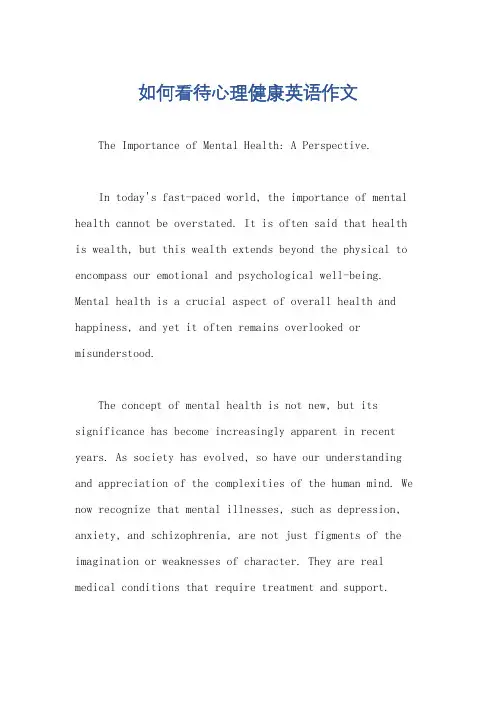
如何看待心理健康英语作文The Importance of Mental Health: A Perspective.In today's fast-paced world, the importance of mental health cannot be overstated. It is often said that health is wealth, but this wealth extends beyond the physical to encompass our emotional and psychological well-being. Mental health is a crucial aspect of overall health and happiness, and yet it often remains overlooked or misunderstood.The concept of mental health is not new, but its significance has become increasingly apparent in recent years. As society has evolved, so have our understanding and appreciation of the complexities of the human mind. We now recognize that mental illnesses, such as depression, anxiety, and schizophrenia, are not just figments of the imagination or weaknesses of character. They are real medical conditions that require treatment and support.One of the most significant barriers to addressing mental health issues is the stigma that often surrounds them. People with mental illnesses are often treated with suspicion, fear, or even contempt. This stigma can lead to isolation, which in turn can exacerbate the symptoms of mental illness. It is crucial that we overcome this stigma and treat mental health issues with the same seriousness and compassion as we do physical health issues.To achieve this, education is key. We need to raise awareness about mental health and its importance. We need to dispel myths and misconceptions about mental illnesses and replace them with facts and understanding. We need to teach people that mental health is not something to be ashamed of, but something to be proud of and nurtured.Another crucial aspect of promoting mental health is the provision of accessible and affordable mental health services. Many people who need help for mental illnesses do not seek it because they fear the stigma or because they cannot afford the cost. It is essential that we create a system that provides equal access to mental health care,regardless of social or economic status.Furthermore, we need to create a culture that values and supports mental health. We need to encourage people to prioritize their mental well-being, to take time for themselves, and to seek help when needed. We need to normalize the discussion of mental health issues and make it okay to talk about our feelings and struggles.In conclusion, mental health is fundamental to our overall well-being and happiness. It deserves the same attention and respect as physical health. By overcoming the stigma associated with mental illnesses, providing accessible mental health services, and creating a culture that supports mental well-being, we can move towards a society where everyone can achieve their full potential, both mentally and physically.The road ahead is not without challenges, but with commitment, understanding, and compassion, we can make significant progress in promoting mental health and well-being. It is a journey that requires not just individualsbut also communities, governments, and organizations to come together and work towards a common goal. Let us all play our part in creating a world where mental health is celebrated and supported, where everyone can live their best lives.。
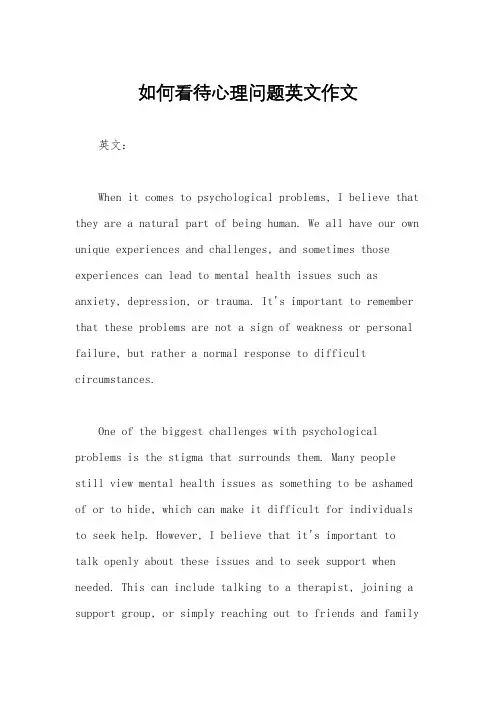
如何看待心理问题英文作文英文:When it comes to psychological problems, I believe that they are a natural part of being human. We all have our own unique experiences and challenges, and sometimes those experiences can lead to mental health issues such as anxiety, depression, or trauma. It's important to remember that these problems are not a sign of weakness or personal failure, but rather a normal response to difficult circumstances.One of the biggest challenges with psychological problems is the stigma that surrounds them. Many peoplestill view mental health issues as something to be ashamed of or to hide, which can make it difficult for individuals to seek help. However, I believe that it's important totalk openly about these issues and to seek support when needed. This can include talking to a therapist, joining a support group, or simply reaching out to friends and familyfor help.It's also important to recognize that there is no "one size fits all" solution when it comes to psychological problems. What works for one person may not work for another, and it's important to find the right approach for your own unique needs. For example, some people may benefit from medication, while others may find that therapy or lifestyle changes are more effective.Ultimately, I believe that the key to addressing psychological problems is to approach them with compassion and understanding. We all have our own struggles and challenges, and it's important to support one another in our journeys towards mental health and well-being.中文:在谈到心理问题时,我认为它们是人类的自然组成部分。
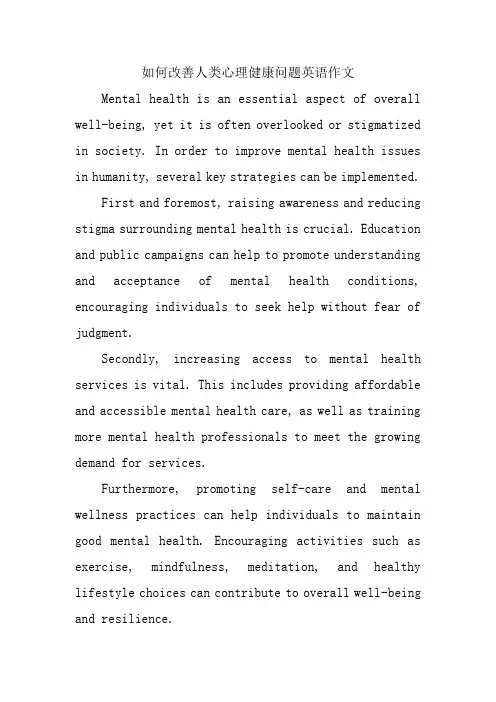
如何改善人类心理健康问题英语作文Mental health is an essential aspect of overall well-being, yet it is often overlooked or stigmatized in society. In order to improve mental health issues in humanity, several key strategies can be implemented.First and foremost, raising awareness and reducing stigma surrounding mental health is crucial. Education and public campaigns can help to promote understanding and acceptance of mental health conditions, encouraging individuals to seek help without fear of judgment.Secondly, increasing access to mental health services is vital. This includes providing affordable and accessible mental health care, as well as training more mental health professionals to meet the growing demand for services.Furthermore, promoting self-care and mental wellness practices can help individuals to maintain good mental health. Encouraging activities such as exercise, mindfulness, meditation, and healthy lifestyle choices can contribute to overall well-being and resilience.In addition, creating supportive environments in schools, workplaces, and communities can help to prevent mental health issues and provide a safety net for those in need. Building strong social connections, fostering a sense of belonging, and promoting open communication can all contribute to better mental health outcomes.In conclusion, improving mental health issues in humanity requires a multi-faceted approach that includes awareness, access to services, self-care practices, and supportive environments. By working together to address these challenges, we can create a society that prioritizes mental health and well-being for all.中文翻译:心理健康是整体幸福的重要组成部分,然而在社会中常常被忽视或受到污名化。
大学生心理健康问题外文文献最新译文文献出处:Hunt Justin. "Mental health problems and help-seeking behavior among college students." Journal of Adolescent Health46.1 (2014): 3-10.原文Mental Health Problems and Help-Seeking Behavior Among College StudentsJustin HuntAlthough the homicides by mentally disturbed college students at Virginia Tech and Northern Illinois University recently captured popular attention, these are atypical cases within a much broader public health issue. Mental disorders are as prevalent among college students as same-aged nonstudents, and these disorders appear to be increasing in number and severity. College students are often viewed as a privileged population, but they are not immune to the suffering and disability associated with mental illness.Mental health among college students represents not only a growing concern but also an opportunity, because of the large number of people who could be reached during an important period of life. More than 65% of American high school graduates attend postsecondary education, Mental disorders account for nearly one-half of the disease burden for young adults in the United States, and most lifetime mental disorders have first onset by age 24 years. The college years represent a developmentally challenging transition to adulthood, and untreated mental illness may have significant implications for academic success, productivity, substance use, and social relationships.Campuses have many channels through which they mighthave a positive effect on mental health. College represents the only time in many people's lives when a single integrated setting encompasses their main activities—both career-related and social—as well as health services and other support services. Campuses, by their scholarly nature, are also well positioned to develop, evaluate, and disseminate best practices. In short, colleges offer a unique opportunity to address one of the most significant public health problems among late adolescents and young adults.A robust base of research evidence is necessary for colleges and our society more generally to seize this opportunity. The purpose of this report is to review thepublished studies on college student mental health, while also drawing comparisons to the parallel published data on the general adolescent and young adult populations. Throughout this report we use the term ―college‖ to refer generally to postsecondary education, which includes both undergraduate and graduate students. We take the approach of a narrative review, rather than a more formal systematic review, because our aim is to weave together multiple disparate topics in a reasonably concise article. In reviewing the research evidence, we focus primarily on sources that are likely to generalize to the overall populations of interest: national studies and large multi-campus studies. Specifically, we focus on four primary topics: (1) the current state of mental health in the college student population;(2) risk factors among college students; (3) the apparent worsening in recent years of mental health in this population, and potential explanations for this trend; and (4) the extent to which students with mental health problems are receiving treatment. We conclude with a discussion of practices and policiesaddressing mental health and help seeking on college campuses, and we highlight potential opportunities for improvement.Current state of mental health among college studentsMental health problems are highly prevalent among college students, according to several data sources. In the 2008 National College Health Assessment sponsored by the American College Health Association (ACHA-NCHA), more than one in three undergraduates reported ―feeling so depressed it was difficult t o function‖ at least once in the previous year, and nearly one in 10 reported ―seriousl y considering attempting suicide‖ in the previous year . According to a study of 26,000 students from 70 colleges and universities in 2006, 6% of undergraduates and 4% of graduate students reported having seriously considered suicide in the previous 12 months . In our own survey data from random samples at 26 colleges and universities in 2007 and 2009 (the Healthy Minds Study), we found that 17% of students had positive screens for depression according to the Patient Health Questionnaire–9, including 9% for major depression, and 10% of students had a positive Patient Health Questionnaire screen for an anxiety disorder (panic or generalized anxiety disorder).Blanco et al compared college students and non–college-attending young adultsacross a wide range of psychiatric disorders in a nationally representative sample, the 2002–2003 National Epidemiological Survey of Alcohol and Related Conditions (NESARC). They found that college students and their non–college-attending young adult peers had approximately the same overall 12-month prevalence of mental disorders using a validated and fully structured diagnostic interview (Alcohol Use Disorder and Associated Disabilities Interview Schedule—DSM-IV version).The overall prevalence of mood and anxiety disorders was also roughly equal across the two groups, although the specific condition of bipolar disorder was less prevalent among students. Almost half of college students met the DSM-IV criteria for at least one mental disorder in the previous year, including 18% for a personality disorder, 12% for an anxiety disorder, and 11% for a mood disorder.In conjunction with these findings on internalizing disorders, many studies have documented widespread alcohol misuse on campuses. In the national analysis by Blanco et al, college students had a higher prevalence of alcohol use disorders than their same-age peers but a lower prevalence of drug use disorders and nicotine use. This is consistent with other studies indicating that alcohol use disorders are more prevalent among college students, but nicotine and drug use disorders are more prevalent among same-age nonstudents.Risk factors among college studentsWithin the college population certain subgroups have a significantly higher prevalence of mental health problems, which is consistent with studies of the general population. Male undergraduates are at a higher risk for suicide, but female students are more likely to screen positive for major depression and anxiety disorders. Students from lower socioeconomic backgrounds are at a higher risk for depressive and anxiety symptoms. Poor men, low social support, or victimization by sexual violence. Although mental health clearly varies across certain demographic and social factors, relatively little is known about how it varies with respect to factors more specific to the college setting, such as academic workload and competition. Some studies show that personality traits, such as perfectionism,are important moderators determining the amount of psychological distress that students report as a result of their collegestudies. The academic environment may be particularly stressful for minority students at predominantly white institutions, according to some studies. We were, however, unable to identify any studies with representative samples on how mental health relates to other characteristics of the academic setting, such as enrollment size, selectivity, competitiveness, supportiveness of academic personnel, and field of study. As in the general population of youth, risk factors for mental disorders among students must also be understood in the context of genetic factors and how these pre-existing vulnerabilities interact with environmental factors in college. Research on these relationships is still in its infancy for college populations and will warrant increased attention in future work. Learning more about the role of these factors in mental health will be useful for informing efforts to create campus environments that promote better mental health.Are mental health problems increasing among college students?The epidemiological data summarized above clearly indicate that mental health problems are highly prevalent among college students. Less clear is whether students are more psychologically disturbed today than they were in the past. Two national surveys are cited frequently when researchers, clinicians, and policymakers argue there is increasing prevalence of mental illness among students. First, in a 2008 national survey of directors of campus psychological counseling centers, 95% of directors reported a significant increase in severe psychologicalproblems among their students. Second, in the ACHA-NCHA national surveys of students, the proportion reporting to have ever. Although impressive and concerning, this evidence may reflect increases in help-seeking behavior as opposed to increases in overall prevalence of disorders. In this section, we consider this alternative explanation in light of available evidence from the general population. We then consider, if the prevalence of disorders has in fact increased, whether such an increase would likely be a result of broader societal trends or factors specific to college populations and settings. In framing this discussion, we acknowledge the multiple challenges to interpreting the evidence including the confounding of changing stigma associated with mental illness and seeking mental health care, changing DSM diagnostic criteria, and possibly improved screening for mental illness.To begin, the near unanimity by which college mental health personnel report increasing numbers of serious mental health problems leaves little doubt that more of these students than ever are coming into contact with campus health services. These reports may, however, represent an increase in help-seeking behavior rather than a true increase in prevalence. The same question applies to other evidence of increasing severity or prevalence among campus health service and counseling clients. In the absence of consistent data over time on disorders in overall student populations, it is unclear how the overall prevalence and severity have changed.One strategy for trying to interpret the trends is to examine how the increase in the number of students with mental disorders who are in contact with health providers (e.g., the increase from 10 to 15 with diagnosed depression) compareswith evidence on increases in help-seeking behavior, conditional on having a diagnosable disorder, in general populations. Because there are no consistent data on mental health treatment over time from representative adolescent populations, we examine trends from general adult samples. The Epidemiologic Catchment Area Study was one of the first large-scale studies to provide data on help seeking, showing that in 1985 only 19% of respondents with recent mental disorders received any treatment in the year before the interview. In data collected in 1992, the National Comorbidity Survey (NCS) found that 25% of those diagnosed with 12-month disorders received treatment in the year before the interview, indicating an increase relative to the 1980s. Most recently, the National Comorbidity Survey Replication (NCS-R) fielded in 2002 demonstrated that the increase in help seeking continued between the early 1990s and the early 2000s: 41% of the NCS-R respondents meeting criteria for a past-year disorder received treatment in the previous year . Considering that attitudes toward seeking mental health treatment seem to have improved more in young adults than in older adults , it seems plausible that the increase in help seeking, conditional on mental health status, among college students has been at least as large as that in the general adult population.译文大学生心理健康问题和求助行为贾斯汀·亨特尽管弗吉尼亚理工大学杀人案的大学生患有一定程度的精神障碍以及北伊利诺伊大学最近获得的消息,这些是广泛的公共卫生问题里的非典型病例。
The Importance of Mental HealthAwarenessMental health awareness is a crucial issue that affects people all around the world. It is important to understand the significance of mental health and the impact it has on individuals, families, and communities. In this essay, I will discuss the importance of mental health awareness and the ways in which it can be promoted and supported. First and foremost, mental health awareness is important because it helps to reduce the stigma and discrimination associated with mental illness. Many people who suffer from mental health issues often face prejudice and judgment from others, which can prevent them from seeking help and support. By raising awareness and promoting understanding of mental health, we can create a more inclusive and supportive environment for those who are struggling. Furthermore, mental health awareness is essential for promoting early intervention and prevention of mental health problems. By educating people about the signs and symptoms of mental illness, we can help individuals recognize when they or someone they know may need help. This can lead to earlier intervention and treatment, ultimately improving outcomes for those affected by mental health issues. In addition, mental health awareness is important for promoting overall well-beingand resilience in individuals and communities. When people are aware of the importance of mental health, they are more likely to take steps to prioritizetheir own well-being and seek support when needed. This can lead to improvedmental health outcomes and a stronger, more resilient community as a whole. Moreover, mental health awareness is crucial for reducing the economic burden of mental illness. Mental health issues can have a significant impact on productivity, healthcare costs, and overall quality of life. By raising awareness and promoting early intervention, we can reduce the economic burden of mental illness and improve the overall well-being of society. In conclusion, mental health awareness is a crucial issue that has a significant impact on individuals, families, and communities. By promoting understanding, early intervention, and overall well-being, we can work towards creating a more supportive and inclusive society for those affected by mental health issues. It is important that we continue toprioritize mental health awareness and support those who are struggling with mental illness.。
Mental Health Awareness in Universities Mental health awareness in universities is a critical issue that needs to be addressed with urgency. The mental well-being of students is often overlooked, and the stigma surrounding mental health can prevent students from seeking the help they need. This can have serious consequences on their academic performance, personal relationships, and overall quality of life. It is essential for universities to prioritize mental health awareness and provide adequate support and resources for their students. One of the main challenges in addressing mental health in universities is the stigma attached to mental illness. Many students may feel ashamed or embarrassed to seek help for their mental health issues, fearing judgment or discrimination from their peers and professors. This stigma can prevent students from reaching out for support, leading to a worsening of their mental health and potentially causing them to drop out of university altogether. Universities need to actively work to break down this stigma and create an environment where students feel comfortable seeking help for their mental health. Another challenge is the lack of resources and support for students with mental health issues. Many universities have limited counseling services and long wait times for appointments, making it difficult for students to access the help they need in a timely manner. Additionally, there may be a lack of education and awareness about mental health issues among faculty and staff, leading to a lack of understanding and support for students who are struggling. Universities need to invest in more resources for mental health support, including increasing the number of counselors available to students and providing training for faculty and staff on how to support students with mental health issues. Furthermore, the academic pressure and competitive nature of university life can take a toll on students' mental health. The demands of coursework, exams, and extracurricular activities can be overwhelming, leading to stress, anxiety, and depression. It is important for universities to recognize the impact of academic pressure on students' mental health and to implement measures to support students in managing their workload and prioritizing their well-being. This could include promoting a healthy work-life balance, providing stress management workshops, and encouraging open communication between students and faculty about mental health concerns. Inaddition, the transition to university life can be a significant source of stress for many students. Moving away from home, making new friends, and adjusting to a more independent lifestyle can be challenging and can exacerbate existing mental health issues or trigger new ones. Universities need to provide support for students during this transition period, including orientation programs that address mental health and resources for students to connect with support services on campus. Creating a supportive and inclusive community for students can help to alleviate the stress of this transition and promote positive mental health. Finally, it is important for universities to foster a culture of open communication and support for mental health. This includes promoting mental health awareness through events, workshops, and campaigns, as well as creating spaces for students to openly discuss their mental health and seek support from their peers. By normalizing conversations about mental health and creating a supportive community, universities can help to reduce the stigma surrounding mental illness and encourage students to seek the help they need. In conclusion, mental health awareness in universities is a complex issue that requires a multifaceted approach. It is essential for universities to work towards breaking down the stigma surrounding mental health, providing adequate resources and support for students, addressing the impact of academic pressure, supporting students during the transition to university life, and fostering a culture of open communication and support for mental health. By prioritizing mental health awareness, universities can create a healthier and more supportive environment for their students, ultimately leading to improved academic performance and overall well-being.。
The Importance of Mental HealthAwarenessAs an experienced article writing expert, I understand the importance of addressing the topic of mental health awareness. Mental health is a crucial aspect of overall well-being, yet it is often overlooked or stigmatized in many societies. It is essential to raise awareness about mental health to promote understanding, empathy, and support for those who may be struggling with mental health issues. First and foremost, mental health awareness is important because it helps toreduce the stigma surrounding mental illness. Many people who suffer from mental health conditions face discrimination, prejudice, and misunderstanding from others. By increasing awareness and understanding of mental health, we can work towards creating a more inclusive and supportive environment for those who are affected. Furthermore, promoting mental health awareness can help to encourage individualsto seek help when they are struggling. Many people may be hesitant to reach outfor support due to fear of judgment or shame. By normalizing conversations about mental health and emphasizing the importance of seeking help, we can empower individuals to prioritize their mental well-being and access the resources they need. In addition, raising awareness about mental health can also lead to improved access to mental health services and resources. In many communities,there is a lack of adequate support for those dealing with mental health issues.By shedding light on the importance of mental health, we can advocate for better funding, policies, and services to ensure that everyone has access to the carethey need. Moreover, mental health awareness can also contribute to the overall well-being of society. When individuals are supported in their mental health, they are better able to contribute to their communities, workplaces, and families. By prioritizing mental health, we can create a more resilient and thriving society as a whole. It is also important to recognize that mental health awareness is notjust about addressing mental illness, but also about promoting mental well-being. By encouraging self-care, stress management, and healthy coping strategies, we can help individuals to maintain good mental health and prevent the onset of more serious issues. In conclusion, the importance of mental health awareness cannotbe overstated. By promoting understanding, reducing stigma, improving access to resources, and prioritizing mental well-being, we can create a more compassionate and supportive society for all. It is crucial that we continue to advocate for mental health awareness and work towards a world where everyone can thrive mentally and emotionally.。
The Importance of Mental HealthAwarenessMental health awareness is a topic that has gained significant attention in recent years, and for good reason. The importance of mental health awareness cannot be overstated, as it plays a crucial role in our overall well-being and quality of life. From reducing stigma to promoting self-care and seeking help when needed, understanding and prioritizing mental health is essential for individuals, communities, and society as a whole. One of the key reasons why mental health awareness is so important is the prevalence of mental health issues in today's world. According to the World Health Organization, mental health disorders affect one in four people globally, making it a common and widespread issue. By raising awareness about mental health, we can help reduce the stigma and discrimination that often surround these disorders, making it easier for individuals to seek help and support. In addition to reducing stigma, mental health awareness also plays a crucial role in promoting self-care and well-being. By educating individuals about the importance of mental health and providing them with the tools and resources they need to take care of their mental well-being, we can empower people to prioritize their mental health and make positive choices that support theiroverall well-being. This can include practicing self-care activities such as exercise, mindfulness, and relaxation techniques, as well as seeking professional help when needed. Furthermore, mental health awareness is important for promoting early intervention and treatment for mental health issues. By educatingindividuals about the signs and symptoms of common mental health disorders, we can help them recognize when they or someone they know may be struggling and encourage them to seek help. Early intervention is key in managing mental health issues and preventing them from escalating into more serious problems, so raising awareness about mental health can help ensure that individuals get the support they need when they need it. Another important aspect of mental health awareness is itsrole in fostering a supportive and understanding community. By promoting open and honest conversations about mental health, we can create a culture of acceptance and support where individuals feel comfortable discussing their mental healthstruggles and seeking help without fear of judgment or discrimination. This sense of community can be incredibly powerful in helping individuals feel less alone in their struggles and more connected to others who may be going through similar experiences. From a societal perspective, mental health awareness is also crucial for addressing systemic issues that contribute to mental health disparities. By raising awareness about the social determinants of mental health, such as poverty, discrimination, and access to healthcare, we can advocate for policies and programs that support mental health equity and ensure that all individuals have access to the resources they need to thrive. This can help reduce the burden of mental health issues on individuals, families, and communities, and create a more just and equitable society for all. In conclusion, the importance of mental health awareness cannot be overstated. From reducing stigma and promoting self-care to fostering a supportive community and advocating for systemic change, mental health awareness plays a crucial role in promoting the well-being of individuals and society as a whole. By prioritizing mental health awareness and education, we can create a more compassionate and understanding world where everyone has the support they need to thrive.。
The Challenges of Mental HealthAwarenessMental health awareness is a critical issue that affects individuals worldwide. The challenges surrounding mental health awareness are multifaceted and complex, making it a topic that requires continuous attention and effort to address effectively. One of the primary challenges of mental health awareness is thestigma and discrimination that often accompany mental health conditions. Many individuals who struggle with mental health issues face judgment and prejudicefrom society, which can prevent them from seeking help and support. This stigmacan also lead to feelings of shame and isolation, further exacerbating the individual's mental health struggles. Another challenge of mental health awareness is the lack of education and understanding about mental health conditions. Many people may not be aware of the signs and symptoms of mentalhealth disorders, leading to misunderstandings and misconceptions about these conditions. This lack of awareness can prevent individuals from recognizing when they or someone they know may be struggling with a mental health issue, delaying access to necessary treatment and support. Additionally, the lack of education about mental health can perpetuate harmful stereotypes and myths, further contributing to the stigma surrounding mental health conditions. Access to mental health resources and support is another significant challenge in mental health awareness. Many individuals may not have access to affordable mental health services, such as therapy and medication, due to financial constraints or lack of insurance coverage. This lack of access can prevent individuals from receiving the care they need to manage their mental health conditions effectively, leading to worsened symptoms and increased distress. Additionally, there may be a shortage of mental health professionals in certain areas, making it difficult for individuals to find the help they need in a timely manner. The intersection of mental health and other social issues, such as poverty, discrimination, and trauma, presents another challenge in mental health awareness. Individuals who face systemicbarriers and social injustices may be at a higher risk for developing mentalhealth issues, yet may also face additional challenges in accessing appropriatecare and support. Addressing mental health awareness requires a holistic approach that considers the interconnected nature of mental health and social issues, working to dismantle systemic barriers and promote equity in mental health care. The media and popular culture play a significant role in shaping perceptions and attitudes towards mental health, presenting both opportunities and challenges in mental health awareness. While media representation of mental health can helpraise awareness and reduce stigma, it can also perpetuate harmful stereotypes and misconceptions about mental health conditions. Media portrayals of mental health may sensationalize or romanticize certain aspects of mental illness, leading to misunderstandings and trivialization of these serious conditions. It is essential for media outlets to portray mental health issues accurately and sensitively, promoting understanding and empathy towards individuals struggling with mental health challenges. In conclusion, the challenges of mental health awareness are diverse and complex, requiring a multifaceted approach to address effectively. By combating stigma and discrimination, increasing education and awareness, improving access to mental health resources, addressing social determinants of mental health, and promoting accurate media portrayals, we can work towards a more compassionate and supportive society for individuals struggling with mental health issues. It is essential for individuals, communities, and policymakers to come together to prioritize mental health awareness and advocate for the resources and support needed to promote mental well-being for all.。
Search all journals Advanced Search Search H
Journal of Health and Social Behavior
doi: 10.1177/002214650905000401
Journal of Health and Social Behavior December 2009 vol. 50 no. 4 377-394
Toward Explaining Mental Health Disparities
Carol S. Aneshensel
Author Affiliations
Carol S. Aneshensel
is a professor of community health sciences in the School of Public Health, University of
California, Los Angeles. Her research primarily addresses the social origins of
psychological disorder, for the most part, depressive symptoms. It spans the life course
from adolescence through old age. Her work typically employs large survey samples
and complex multivariate statistical analysis of longitudinal data. Other areas of
research include the mental health impact of caregiving for persons with dementia and
persons with HIV/AIDS, and the social and cultural determinants of adolescent fertility-
related behavior. Her most recent work examines the linkages between the
socioeconomic stratification and racial-ethnic segregation of neighborhoods and health,
including depression, cognitive functioning, physical health, and mortality. Work in
progress applies a life course perspective to variations in the impact of neighborhood.
She is a prior recipient of the Leonard I. Pearlin Award for distinguished contributions to the sociological study of mental health.
Abstract
Mental health disparities refer to the disproportionate amount of psychopathol-ogy
found among persons of disadvantageous social standing, such as persons of low
socioeconomic status (SES). Although social and self selection cannot entirely be ruled
out as explanations for these differences, the accumulation of evidence supports a
social causation interpretation for a large portion of this association for many disorders.
The stress process model is applied to understand how social inequities become
mental health disparities. Data from the Los Angeles Depression Study, originated by
Leo Reeder, are used to illustrate the key idea that explicit causal models are essential
to the development of programmatic interventions to alleviate mental health disparities,
as distinct from interventions to improve mental health in general. In light of recent work
on neighborhood stratification and mental health, I advocate the modification of the
social contexts of the stress process.
+ Sign In |
My。